The Totally True Story of Pedro’s Ancestors
In reply to a flood of letters — and I want to thank both of you who wrote — The Boss has assigned a flunky to take down the history of my family as I tell it. At last you will hear the true story of Don Juan Pedro Ladino de Philmonte, known to many of you as plain Pedro. (Flunky note: Also Flopears, Hayburner, Dragalong and Oatsmobile.)
The earliest known member of my family was a handsome fellow known formally as Equus Asinus, but people in those days were pretty informal, so they gave him the nickname of EEE-Onk. I’ve never been able to figure out why.
Old EEE-Onk was grazing with his family in an African pasture near the river Nile one afternoon when he was set upon by a band of Egyptians looking for a pyramid construction crew. There was a fierce battle, but EEE-Onk was at last held fast by the 30 professional wrestlers who were sent to take him.
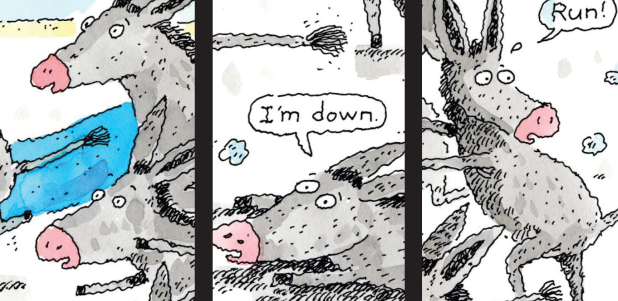
His only happiness lay in knowing that his heroic fight had bought time for the rest of his band to escape. (Flunky note: Ancient Egyptian writings found in a pyramid say the first wild donkey in Egypt was captured while asleep.)
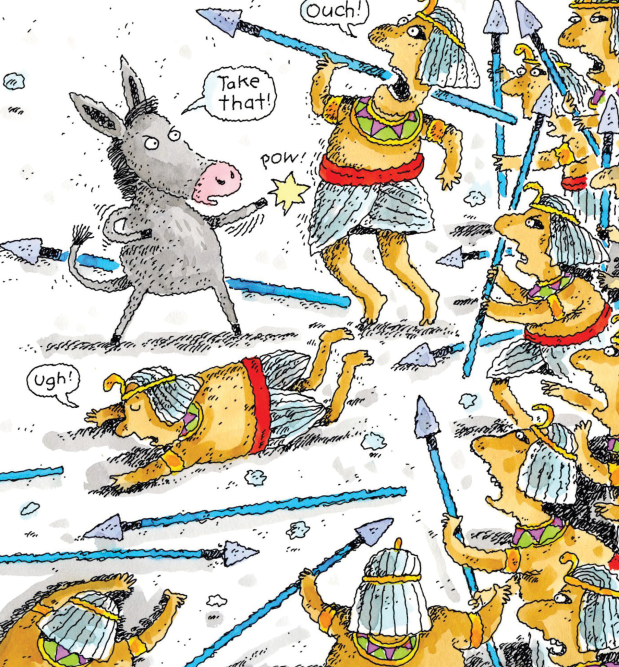
Poor EEE-Onk was put to (ugh!) work with the pyramid gangs, but that type of treatment didn’t last long. The Pharaoh soon learned it was hard to manage fearless burros.
In time, other members of EEE-Onk’s family were captured.
As the number of burros grew, people began to recognize burro brilliance. The head of the burro tribe, Abou ben Assam, was singled out to be Ambassador to the Moorish tribes of North Africa. (Flunky note: Abou was traded to a Moorish fruit merchant for one sack of green figs.)
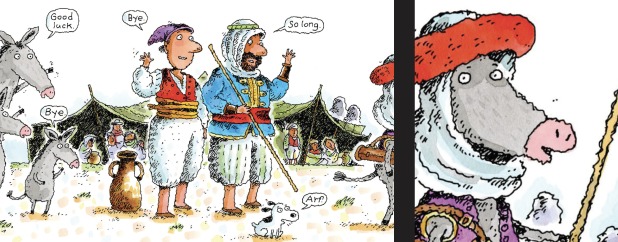
Unfortunately, Abou ran into a sandstorm during his crossing of the Sahara. He was rumpled and dirty when he finally reached the Moorish capital and, alas, was mistaken for a common beast of burden. Abou was pressed into a Moorish task force headed for an invasion of Spain. One less quickwitted might have been dismayed, but not Abou. When the army arrived in Spain, Abou waited until dark, slipped through a cordon of fierce Moorish guards and made his way to the Spanish forces. (Flunky note: Abou fell asleep and got captured, just like his great-great-great-grandfather EEE-Onk.)
The Spaniards saw at once the keen intellect of the burro. Abou was made assistant to the royal family of Spain. In years to come, Abou’s heirs got the title of “Don.” (Flunky note: Hardly honorific, it was short for “Donkey.”)
One of these dons, Don Pedro Francisco Alvarez Conquistador de Cuernavaca, heard his country’s call for soldiers to conquer New Spain, as Mexico was called in those days. There were hazards in the New World, as Don Pedro Conquistador well knew, but my family has never been one to avoid danger. (Flunky note: They put a pack on his back and dragged him up the gangplank.)
Don Pedro sailed with Cortes’ conquistadors for the New World. There he settled in the small mountain village of Cuernavaca. The village and land for miles around it were given to Don Pedro as a reward for valiant services during the conquest of Mexico. Here Don Pedro raised a family and lived like a king off the fat of Mexico.
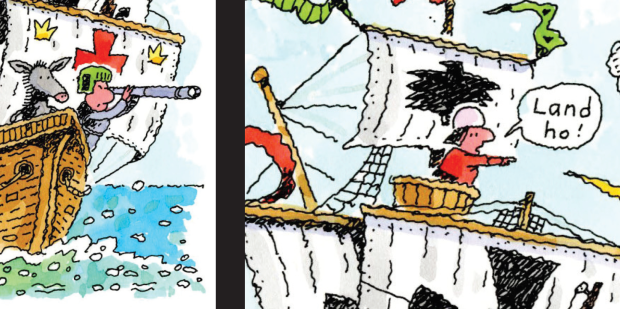
Unfortunately, all this soft living resulted in a lazy rascal in our family. This four-hooved wastrel was Don Juan de las Grutas de Cacahuamilpa. The grutas, or caves, near the little town of Cacahuamilpa were Don Juan’s daytime hideout from work. In the evenings, he went serenading and raiding in local gardens.
Don Juan made a bad name for himself. When it was rumored there was much gold in the country around what is now Philmont Scout Ranch, the Viceroy knew just the burro to send on the expedition.
And so my family came to what would become the United States, about 100 years before the Mayflower.
When Kit Carson and other mountain men moved into the Philmont country, it was just natural that they would turn to Don Juan. He was the interpreter in dealing with almost all the Indian tribes. He could also find the trappers the best markets for their pelts. (Flunky note: He carried the pelts to market on his back.)

It is sad to say that Don Juan de las Grutas de Cacahuamilpa was the last noteworthy member of our family until the present generation. (Flunky note: Ahem!) Most of Don Juan’s later family members were engaged in prospecting for gold, hunting for the Lost Dutchman Mine or the Seven Cities of Cibola, and similar tasks. In time, as the wide open spaces of the West became settled, burros were replaced by the iron horse, and later by the pickup truck. People forgot the faithful, hardworking burro. (Flunky note: There should be sad violin music playing at this point.)
One unhappy result of this neglect was that many of my foreburros, their great talents being wasted, began to act like the Don Juan of old. They took to hiding out in caves and canyons in the daytime and at night dining in the vegetable gardens of farmers.
Too honorable to steal, the burros would pay for their meals by serenading the gardeners. There are some folks who do not appreciate the sweet music of the burro in full. Experts, however, speak of us as “mountain canaries.” Rudolf Friml, in his famous Spanish operetta, “The Firefly,” made the “Donkey Serenade” his most important opus. (Flunky note: The braying of the burro has been known to drive whole camps of gold prospectors to the verge of madness.)
Not all of Don Juan’s offspring fled the wilds. The more ambitious burros were sure that talents such as theirs would always be needed somewhere or other. In later years they were vital to the growth of Philmont Scout Ranch.
Among the burros of Philmont, one stood out as being above the high average of his clan. Because of this animal’s great energy and cleverness, the ranch management chose him for a special job. They sent him to use his genius to help the overworked staff of Boys’ Life magazine. (Flunky note: They had a balky burro and wanted to unload him.)
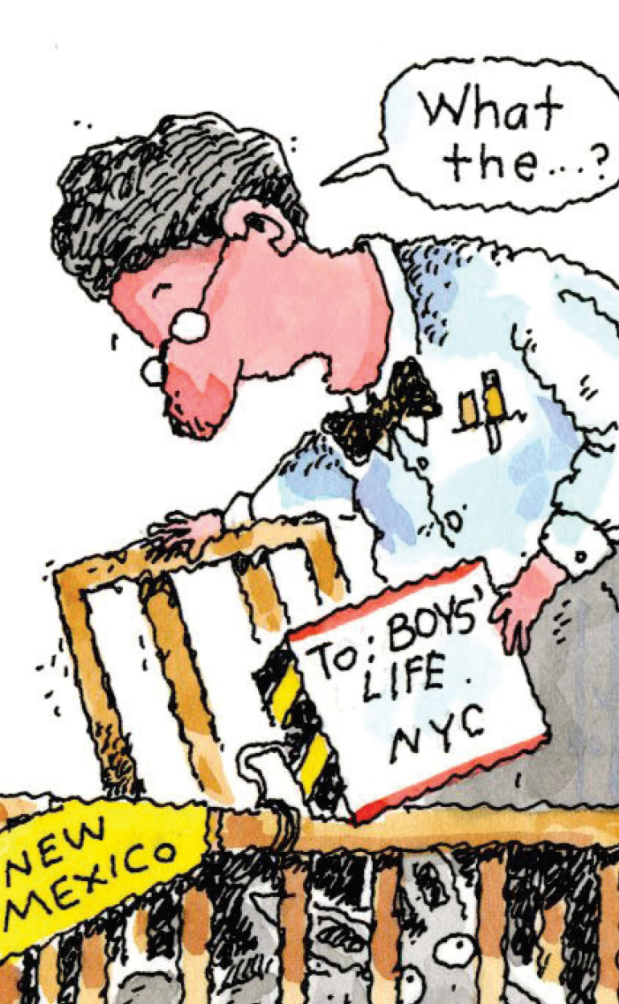
Thus, on a fateful day in 1947, a crate was shipped from New Mexico to the editor of Boys’ Life. The editor was puzzled to find inside the crate one small-type burro.
Soon, however, he recognized the burro’s special gifts and trusted him with the handling of all letters from Boys’ Life readers. (Flunky note: The burro totes the mail sack — with somewhat minimal loss and destruction of its contents.)
Atop the New York City building that housed the magazine in those days, master carpenters assembled a corral from prime grade lumber. (Flunky note: The cops made the editors get that crate off the busy sidewalk.) This was the burro’s new home, which was to become known to millions of Boys’ Life readers as the “Skyscraper Corral.”
In time, it became clear the city was not the place for the sensitive, desertbred genius. To improve his work in his key role in the running of Boys’ Life, 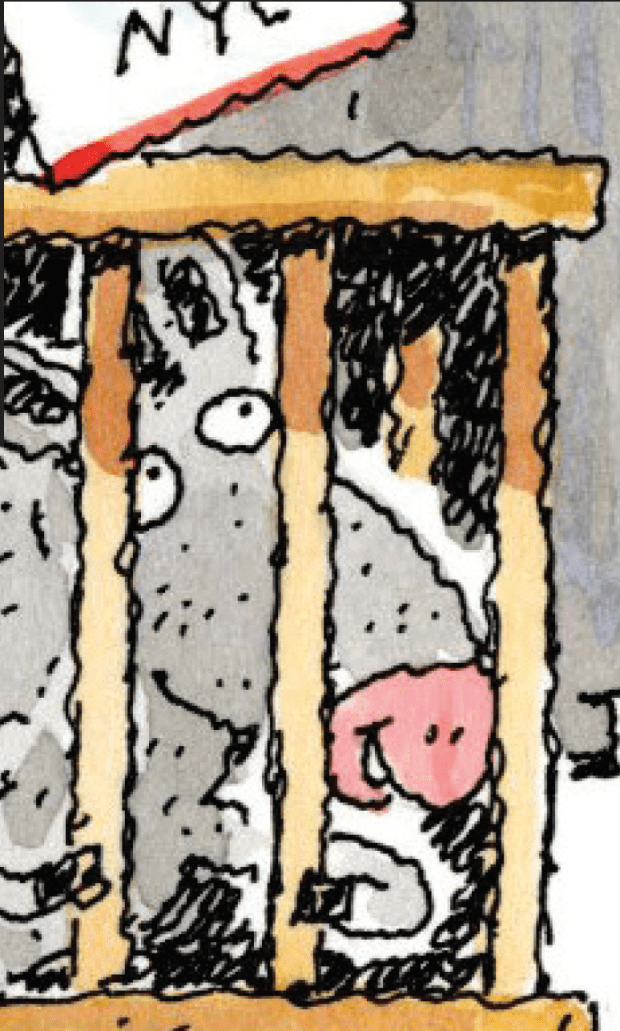 the Boy Scouts of America moved its headquarters first to the green pastures of central New Jersey, then to the prairie of northern Texas.
the Boy Scouts of America moved its headquarters first to the green pastures of central New Jersey, then to the prairie of northern Texas.
Now the noble burro is in the wide-open spaces of the Southwest and at the same time close enough to the major cities of Dallas and Fort Worth. His corral looks out on rolling acres of mesquite trees on one side and the busy runways of Dallas/Fort Worth International Airport on the other. At the click of a burro-shoe, he can zoom away to visit readers anywhere in the nation or rest his busy brain in the warm sunshine of home.
Needless to say, that burro is myself, Don Juan Pedro Ladino de Philmonte, better known to you as Pedro.
Wow!